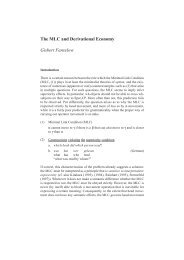Differential subject marking in Polish: The case of Genitive vs ...
Differential subject marking in Polish: The case of Genitive vs ...
Differential subject marking in Polish: The case of Genitive vs ...
Create successful ePaper yourself
Turn your PDF publications into a flip-book with our unique Google optimized e-Paper software.
<strong>The</strong>re is also other (<strong>in</strong> fact more solid) evidence that BE (<strong>in</strong> <strong>Polish</strong> and Russian) is perfective. It<br />
has been noted <strong>in</strong> the literature (see, e.g., Eriksen 2000:3) that the agreement suffixes employed<br />
by what are traditionally called future tense forms <strong>of</strong> byt’ (‘to be’) <strong>in</strong> Russian (i.e., the budet-<br />
forms) are actually ord<strong>in</strong>ary present tense suffixes <strong>of</strong> Russian verbs; cf. (17a). <strong>The</strong> same holds for<br />
the <strong>Polish</strong> “future forms” <strong>of</strong> byc, the bedzie-forms; cf. (17b). 27<br />
(17) a. bud-u (1.SG) piš-u (write-1.SG.PRES) (Russian)<br />
bud-eš’ (2.SG) piš-eš’<br />
bud-et (3.SG) piš-et<br />
bud-em (1.PL) piš -em<br />
bud-ete (2.PL) piš-ete<br />
bud-ut (3.PL) piš-ut<br />
b. bed-e (1.SG) pisz-e (write-1.SG.PRES) (<strong>Polish</strong>)<br />
bedzi-esz (2.SG) pisz-esz<br />
bedzi-e (3.SG) pisz-e<br />
bedzi-emy (1.PL) pisz-emy<br />
bedzi-ecie (2.PL) pisz-ecie<br />
bed-a (3.PL) pisz-a<br />
Nevertheless, the budet-forms, despite be<strong>in</strong>g, morphologically speak<strong>in</strong>g, present tense forms,<br />
have exclusively future time reference; cf. (18a). This is characteristic <strong>of</strong> perfective verbs <strong>in</strong><br />
Slavic; cf. (18b) (see also footnote 21).<br />
(18) a. Ona budet vracom. (Russian)<br />
she NOM be3.SG.PRES doctorINSTR<br />
‘She will be a doctor.’<br />
b. Ona pišet /napišet pis’mo.<br />
she NOM write3.SG.PRES.IMPERF /write3.SG.PRES.PERF letterACC<br />
‘She is writ<strong>in</strong>g/will write a letter.’<br />
27 Although the discussion <strong>in</strong> the ma<strong>in</strong> text is based on Russian, the same observations can be made with respect<br />
to <strong>Polish</strong> as well.<br />
16

















